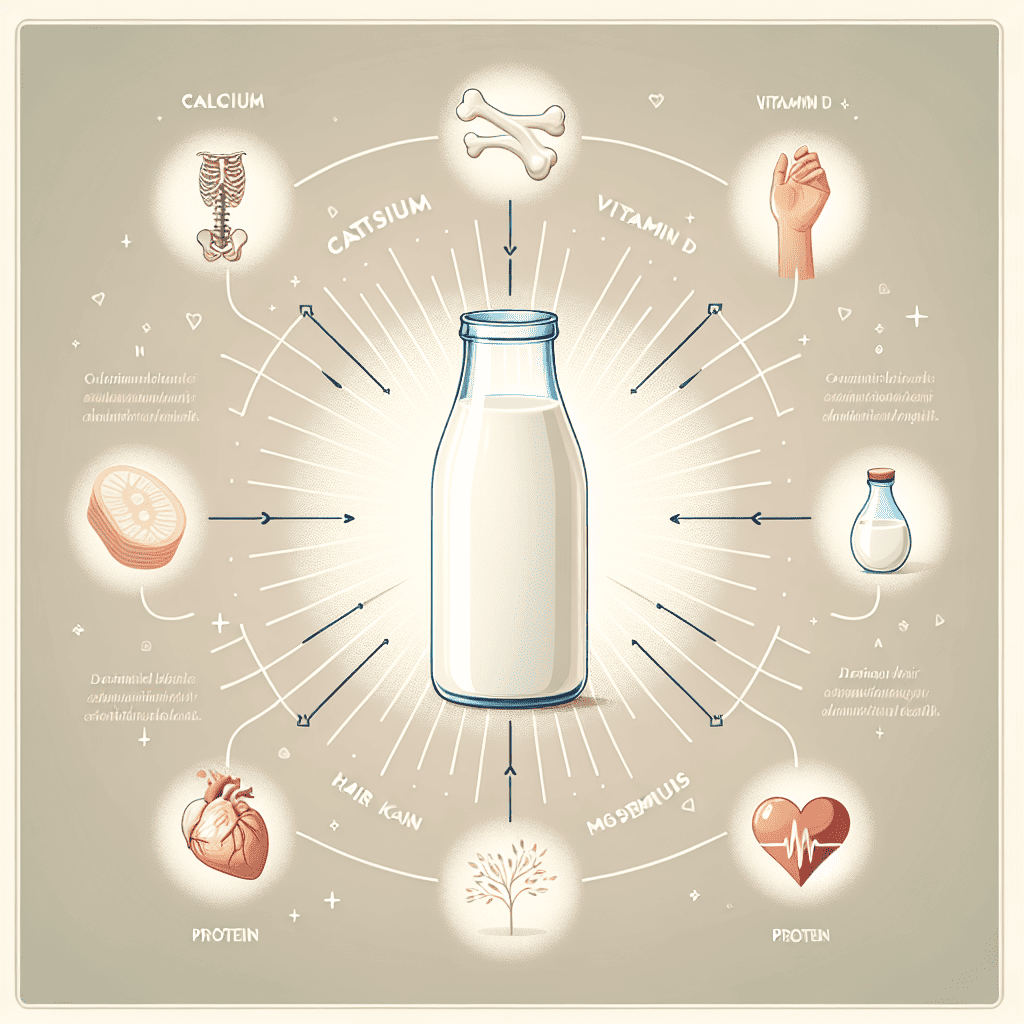Introduction: Health habits, including consuming milk, play a vital role in our overall wellness and are often represented as parables to emphasize their importance. In this blog post, we will explore the significance of drinking milk through an inspiring parable, shedding light on its impact on our health and well-being and why it’s crucial for our children to adopt this healthy habit. Get ready to discover the powerful message behind ‘The Secret of Labib’ and how it encourages us to prioritize the consumption of milk for a healthier future.
Table of Contents
The Significance of Milk Consumption
Before delving into the parable, let’s understand why milk consumption holds significant importance for our health and well-being.
- Importance of Calcium and Vitamins:
Milk provides a significant amount of calcium, a mineral essential for maintaining strong bones and teeth. Calcium is crucial for bone mineralization, which is the process of laying down minerals in bones, making them strong and dense. Adequate calcium intake throughout life, as part of a well-balanced diet, may reduce the risk of osteoporosis, a condition characterized by weak and brittle bones. Vitamin D, often found in fortified milk, helps the body absorb calcium more efficiently, further enhancing its bone-strengthening benefits. By including milk in their diet, individuals can effectively support their skeletal health and prevent bone-related disorders.
In addition to its role in ensuring bone health, milk is a good source of various vitamins, such as vitamin D. Vitamin D is essential for promoting the absorption of calcium and phosphorus in the body, crucial for maintaining overall bone mineral density. Moreover, vitamin D plays a vital role in supporting the immune system, promoting cell growth, and regulating mood. By consuming milk regularly, individuals can ensure they are getting an adequate intake of vitamin D, which is particularly important for individuals who have limited sun exposure, as sunlight is a significant source of this vitamin.
Furthermore, milk contains other essential nutrients, including protein, potassium, and magnesium, which are important for overall health and well-being. Protein is necessary for building and repairing tissues, making it crucial for muscle growth and maintenance. Potassium helps regulate fluid balance, muscle contractions, and nerve signals in the body, while magnesium is involved in more than 300 enzymatic reactions, contributing to processes such as energy production and protein synthesis. With its nutrient-rich profile, milk serves as a convenient and effective way to obtain a variety of essential nutrients that are essential for supporting various bodily functions and promoting overall health.
- Role in Children’s Growth:
Milk is a critical element in children’s diets due to its numerous health benefits. The proteins in milk are essential for muscle development and repair, crucial for ensuring that children grow strong and healthy. Additionally, milk is an excellent source of calcium, necessary for building strong bones and teeth. Children’s bones are continually growing and strengthening, and adequate calcium intake from milk can support this process, decreasing the risk of bone-related issues later in life. Moreover, the vitamins present in milk, such as vitamin D, play a crucial role in calcium absorption, further enhancing its benefits for bone health.
Apart from physical growth, milk also contributes to the overall health and well-being of children. Its nutrient-rich composition provides a balanced source of energy for their daily activities. The combination of proteins, carbohydrates, and fats in milk offers a sustainable source of energy, promoting endurance and stamina in children. Moreover, milk contains other essential vitamins and minerals like vitamin A, potassium, and magnesium, which support various bodily functions and contribute to overall health. By incorporating milk into a child’s diet, parents can ensure that their children receive a diverse range of nutrients important for growth, development, and maintaining good health.
In conclusion, milk plays a vital role in supporting the growth and development of children. Its unique combination of proteins, calcium, vitamins, and other essential nutrients make it a valuable addition to a child’s diet. Ensuring that children consume an adequate amount of milk can help them build strong bones, develop healthy muscles, and maintain overall well-being. By promoting the consumption of milk, parents and caregivers can contribute significantly to the healthy growth and development of children, laying a strong foundation for a healthy and active lifestyle in the future.
The Parable of Labib
Unveiling the inspiring parable that emphasizes the importance of drinking milk for a healthy life.
- The Secret of Labib:
Labib’s story showcases the remarkable impact that a simple dietary choice, such as prioritizing milk consumption, can have on an individual’s life. By focusing on incorporating milk into his daily routine, Labib experienced a significant improvement in his health. Milk, with its rich nutrients like calcium, protein, and vitamins, played a pivotal role in enhancing Labib’s overall well-being. Regular consumption of milk not only contributed to his physical strength and vitality but also had a positive influence on his mental health, fostering a sense of wellness and contentment.
Moreover, Labib’s journey underscores the holistic benefits of milk beyond just being a source of nutrition. The parable sheds light on how milk served as a catalyst for Labib’s transformative journey towards better health and vitality. It symbolizes resilience, growth, and renewal, as Labib’s decision to prioritize milk consumption reflects his commitment to self-care and improvement. This narrative resonates with the idea that making conscious choices about our diet and lifestyle can have a profound impact on our overall quality of life, empowering us to take control of our well-being and embrace positive change.
Labib’s story also carries a broader message about the power of small actions to drive significant transformation. His experience serves as a reminder of the importance of paying attention to seemingly simple aspects of our daily routines, such as the food we consume. By highlighting the transformative power of milk in Labib’s life, the parable encourages us to consider the potential impact of our choices on our health and happiness. It prompts reflection on the ways in which simple changes, like prioritizing milk consumption, can pave the way for profound improvements, inspiring us to approach our well-being with mindfulness and intention.
The Health Benefits of Milk
Exploring the specific health benefits associated with regular milk consumption.
- Nutritional Value of Milk:
Milk is a rich source of calcium, a mineral crucial for maintaining strong and healthy bones. Adequate calcium intake, along with other nutrients like potassium and phosphorus found in milk, plays a vital role in preventing conditions such as osteoporosis and ensuring proper bone development, especially in children and adolescents. Calcium is not only essential for skeletal health but also for muscle function, nerve transmission, and hormonal secretion. Thus, incorporating milk into your daily diet can significantly contribute to overall bone health and physical well-being.
In addition to calcium, milk is also a valuable source of high-quality proteins. Proteins are the building blocks of the body, needed for growth, repair, and maintenance of tissues. The proteins in milk contain all essential amino acids required by the body, making it a complete protein source. Consuming protein-rich foods like milk can aid in muscle recovery and growth, boost metabolism, and help in weight management. Whether you are an athlete looking to enhance performance or an individual aiming to maintain muscle mass, including milk in your diet can be beneficial in meeting your protein needs.
Moreover, the potassium content in milk contributes to regulating blood pressure and balancing fluid levels in the body. Potassium is essential for proper nerve function, muscle contraction, and heart health. By consuming milk regularly, you can not only benefit from its potassium content but also support hydration and electrolyte balance. Furthermore, phosphorus in milk plays a crucial role in energy metabolism, bone mineralization, and maintaining pH balance in the body. This combination of nutrients in milk makes it a versatile and wholesome beverage that can support various aspects of your health and well-being.
- Health Impact on Adults:
Milk is not just beneficial for children; it also provides various health advantages for adults. One of the key benefits of milk for adults is its positive impact on heart health. Milk is a good source of potassium, which helps to regulate blood pressure and reduce the risk of cardiovascular diseases. Furthermore, the presence of calcium and vitamin D in milk contributes to maintaining strong bones and reducing the likelihood of osteoporosis, a condition often associated with aging. By consuming milk regularly, adults can improve their overall heart and bone health.
In addition to heart and bone health, milk can also be helpful in weight management for adults. Contrary to the common misconception that milk might contribute to weight gain, studies show that including low-fat or skim milk in a balanced diet can actually support weight loss efforts. The protein content in milk helps to increase satiety and promote muscle growth, which can aid in boosting metabolism and burning calories more effectively. Moreover, milk is a versatile ingredient that can be incorporated into various healthy recipes, providing a nutritious and satisfying option for adults striving to maintain a healthy weight.
Furthermore, the nutrients found in milk play a vital role in supporting immune function and muscle recovery in adults. Milk contains essential vitamins and minerals like vitamin A, vitamin B12, and riboflavin, which are important for a robust immune system. These nutrients help the body fight off infections and illnesses, keeping adults healthy and resilient. Additionally, the protein in milk is beneficial for muscle recovery post-exercise, making it a convenient and effective choice for individuals engaged in physical activities or sports. With its wide-ranging benefits, milk remains a valuable dietary component for adults seeking to enhance their overall wellness and vitality.
Conclusion
Milk has long been recognized for its essential nutrients such as calcium, vitamin D, and protein, which are crucial for overall health and well-being. Calcium, in particular, is important for building strong bones and teeth, making milk consumption especially vital during childhood when bone development is at its peak. In addition, the protein in milk helps in muscle growth and repair, making it beneficial for both children and adults leading an active lifestyle.
Moreover, milk is not only beneficial for physical health but also plays a role in supporting mental well-being. The vitamins and minerals found in milk contribute to brain function and cognitive development, making it an important part of a balanced diet for individuals of all ages. By including milk in their daily diet, people can improve their concentration, memory, and overall cognitive abilities. This underscores the holistic benefits of milk consumption, beyond just its physical health advantages.
Furthermore, the simplicity and accessibility of milk make it a convenient choice for those looking to improve their health. Whether consumed plain, added to cereals, or used in various recipes, milk can be easily incorporated into daily meals. This versatility makes it easier for individuals to ensure they are reaping the benefits of milk consumption without much effort. By understanding and embracing the lessons from the parable of Labib, people can leverage the nutritional richness of milk to prioritize their health and well-being, ultimately leading to a healthier and more fulfilling life.




